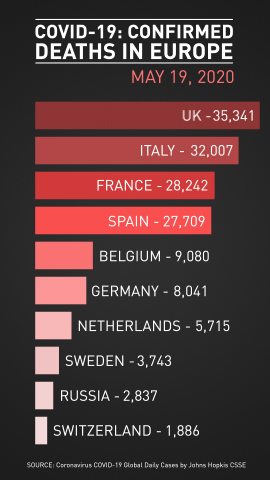TOP HEADLINES
- UK unemployment has spiked in the first quarter as a result of the pandemic, official data have shown. The number has risen by 50,000 to 1.3 million in the first three months of 2020, according the country's Office for National Statistics.
- Greece will announce its operational plan to revive its tourism sector on Wednesday after reports suggested the country's borders may reopen from mid-June.
- Spain's daily death toll has risen by 83 in the past 24 hours to leave the cumulative total at 27,778. This is the third day in a row the country's daily fatalities have been less than 100.
- Beaches in Barcelona will reopen to people living within one kilometer from Wednesday. Visitors to the Spanish city's coastline will still have to respect social distancing, are not allowed to swim and must spend no longer than one hour on the beach.
- Deaths in the UK have risen by 545 in the past 24 hours, pushing the total to 35,341.
- Spain has lifted a ban on direct flights and ships from Italy, but tourism restrictions and a 14-day quarantine for inbound travelers remain in place.
- The wearing of face masks in Spain is to become compulsory, the government has announced. They will be mandatory on public transport, in enclosed spaces and on streets if the minimum safety distance of two meters can't be observed.
- Germany's number of confirmed cases has risen by 513 in the past 24 hours, bringing the total to 175,210. A further 72 fatalities have been recorded as the cumulative total rose to 8,007.
- A further 9,263 new cases have been reported in Russia in the past day, bringing the total to 299,941. Russia's COVID-19 task force has said 115 more people have died, pushing the toll to 2,837.
- Czechia has posted its biggest daily rise in new cases in more than four weeks, 111, bringing the total to 8,586. Despite the increase in cases, the country reported no new deaths.
- Hungary and Slovenia remain in talks about reopening their borders from 1 June after both agreed they can resume international cooperation without compromising public health.
- People arriving in France are being urged to take up a voluntary two-week self isolation period to help prevent the spread of the virus.
- Footballers in the top leagues in England and Spain return to individual training on Tuesday as they ramp up their preparations with the view to a potential restart to competition in June.
- Deaths in the Netherlands has risen by 21 in the past 24 hours. This figure is the lowest number reported on a Tuesday since March and leaves the overall death toll at 5,715.
- Sweden has reported 45 more deaths, bringing the total toll to 3,743. Cases also rose by 422 to 30,799.
- Italy's prime minister, Giuseppe Conte, told the World Health Organization that he was entering the next phase of the pandemic with "cautious optimism and a sense of responsibility" but admitted "our struggle is far from being over.”

Beaches in Barcelona will reopen for people living within one kilometer on Wednesday. /Reuters
Beaches in Barcelona will reopen for people living within one kilometer on Wednesday. /Reuters
ACROSS EUROPE
By Rahul Pathak in Madrid
While fatalities continue to fall, protests against the ongoing lockdown continue to escalate in Madrid.
Some of the capital's most upmarket neighborhoods have been the scene of street demonstrations, with people protesting against the government of Prime Minister Pedro Sanchez.
On Monday, three demostrations took place at various locations around central Madrid. The district of Salamanca has seen street protests take place everyday for the last week. The district of Salamanca has had street protests every day for the past week.
At all of the demonstrations, people have been wearing masks and gloves but the size of the crowds has made it impossible for social-distancing measures to be followed.
By Isobel Ewing in Budapest
Hungary and Slovenia are in talks about reopening their borders by 1 June.
Both countries' governments agree they handled the epidemic successfully thanks to "timely action" and can now begin to resume international cooperation without compromising public health.
Annual trade between the two European Union member states is worth more than 2.5 billion euros ($2.74 billion).
People in Budapest have flocked to the outdoor areas of bars and restaurants as the city enters its first week of gradual reopening.
Experts warn the daily case numbers reflect those in mid-March, when restrictive measures were being tightened. They say masks must continue to be worn in public and large gatherings avoided, to ensure a downward trend in cases.
00:10

By Ross Cullen in Paris
People arriving in France from outside the European Union are being urged to observe a two-week period of "voluntary quarantine."
The foreign minister made the comments to French media as France starts to open up cautiously to internal travelers.
Jean-Yves Le Drian said: "We have reciprocity agreements with our European neighbors… if, by chance, cases do not increase, from 15 June there could be a general easing on free movement in the Schengen area."
Travel into France is tightly controlled at the moment, with a shortlist of those allowed into the country including French citizens, people with their primary residence in France and critical workers.
By Toni Waterman in Brussels
The European Union
Members of the the World Health Assembly, which oversees the World Health Organization, are expected to formally agree to calls for an inquiry into the handling of the coronavirus crisis. The EU, China and the WHO's executive have all said they support an investigation when the time is right.
The second day of virtual talks comes as US President Donald Trump threatens to permanently freeze funding to the WHO and pull the US out of the organization. After a chorus of support for the WHO from leaders and national representatives yesterday, the White House nevertheless renewed its own attacks. Trump gave the organization 30 days to implement change.
Belgium
Belgium's central bank will give its assessment of the economic impact of COVID 19 on Tuesday. The country has been in some state of lockdown for more than two months. BNP Paribas Fortis expects the Belgian economy to shrink by more than 11 percent this year.
Meanwhile, Belgium's foreign affairs minister met with his counterparts from France, the Netherlands, Germany and Luxembourg to strategize a gradual lifting of travel restrictions between the neighbors. The countries share more than 1,380 kilometers of borders, but travel has been severely restricted for the past two months.
Before the crossings can reopen, Belgium would like all countries to exercise similar control measures.
02:07

By Nicole Johnston in London
On Tuesday, the UK is focused on the latest unemployment figures as a result of COVID-19. In the first three months of the year, unemployment increased by 50,000 to 1.3 million.
The Office for National Statistics (ONS) also found hours of work fell sharply in late March, when the UK's lockdown began. This period covered one week of lockdown.
However, in April the number of people claiming unemployment benefits rose from 3.5 percent to 5.8 percent. It is the biggest monthly jump since 1971. An extra 856,500 people claimed state support known as Universal Credit, bringing the total to just over 2 million people.
Meanwhile, a British think tank, the Resolution Foundation, has released a report that found younger and older workers are suffering most from a reduced income.
It says younger workers will experience lower incomes and older workers may become permanently retired, before they reach the minimum age for the state pension.
By Ira Spitzer in Berlin
Germany's Robert Koch Institute reported 513 new coronavirus infections in the country on Tuesday, the 10th straight day with fewer than 1,000 new infections.
More than 1,000 German nationals are still stuck abroad because of coronavirus travel restrictions. According to the dpa news agency, the foreign ministry says there are hundreds of Germans in Morocco, South Africa, Argentina and Pakistan who would like to return but can't because transit connections are unavailable. The foreign ministry has been able to repatriate around 240,000 German citizens since the crisis began.
00:52
